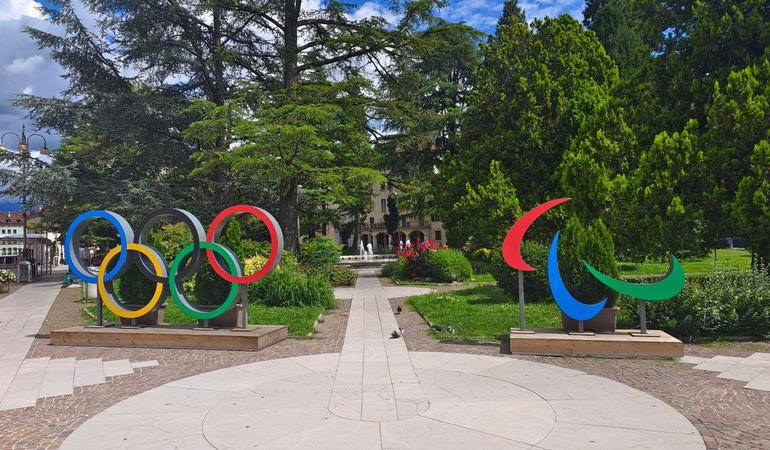
Milano-Cortina. Ecco come verranno spesi i 450 milioni di euro delle paralimpiadi


11 aprile 2023
Up to one year in prison for anyone who defaces works of art, monuments or public buildings. The proposal, which was presented last November by Lega Senator Claudio Borghi, has been filed in recent days in the Justice Committee of the Italian Senate. Another proposal that was presented in recent days is that of Fratelli d'Italia deputy Marco Lisei, which would provide for up to three years in prison. The Council of Ministers on Tuesday 11 April will instead consider the introduction of heavy fines, from 20,000 to 60,000 euros for those who "render all or part of cultural or landscape assets unusable or non-accessible," and lighter fines (from 10,000 to 40,000 euros) for those who "deface or smear."
As demonstrated by the statements of the proponents of the two parliamentary proposals, it is clear that these regulatory changes are intended to directly target climate activists, in particular those of Ultima Generazione (The Last Generation), who have long been trying to draw attention to the dramatic effect of climate change by throwing paint (or other substances) on works of art or buildings. Their last two actions were on the Palazzo Vecchio in Florence and on the Barcaccia, the fountain in Piazza di Spagna in Rome.
There has been widespread condemnation In the face of these actions, and the governing parties and some ministers have been calling for the introduction of punishments, including imprisonment, for these young activists. Once again, as was also the case with the anti-rave decree, the criminal route is being taken to respond to a phenomenon that would instead require other types of approach. This is also because, to date, it is worth emphasising that none of the monuments, works, or buildings attacked have suffered permanent damage and, after minor maintenance operations (we have probably all seen by now the mayor of Florence Dario Nardella personally involved in one of them), everything has been properly restored. In the case of the paintings, the glass cases that protect the paintings from any kind of damage were there to prevent any possible damage.
Moreover, if this had not been the case, the climate activists would have already been prosecuted. In fact, Articles 518 k and 635 of the criminal code, which the Borghi and Lisei proposals intend to amend respectively (by expanding them), already provide for severe penalties, from two to five years for the former, and from six months to three years for the latter. In this sense, these proposals are a dangerous escalation that punishes not the harm as such (also because, as we have just said, there has been no harm so far), but the very form of struggle that — whether right or wrong — has been chosen.
This escalation is aggravated in particular by the second paragraph of the Borghi proposal, i.e. arrest in flagrante delicto, which represents an enormous and disproportionate measure for behavior that poses no social danger whatsoever. That would only have the merit of criminalizing young people, of flooding the courts with further trials — and potentially the prisons that, for some time now, have been experiencing an endemic situation of overcrowding (now over 110%), a fact that has also been underlined in recent days by two separate reports by the Council of Europe's Committee for the Prevention of Prison (Cpt) and the European Parliament's Libe Committee. Equally disproportionate is the use of the Daspo (a ban from taking part in public gatherings, originally used for hooligans), provided for in the Lisei bill, intended to remove from the cities activists who take part in these actions.
The jurist Luigi Ferrajoli, in his theorization regarding minimum criminal law, emphasized how the criminal system should only be used to prosecute crimes that offend the legal goods and values to which the Constitution attributes greater value, with punishments that are never disproportionate to the goods and values offended, in order to reduce the loss of rights in society. In the first months of this government we are instead witnessing the opposite approach. New ad hoc crimes are being created as the result of demonstrations that may be more or less extemporaneous, with penalties that are in many cases disproportionate. However, independently of Ferrajoli's reflection, the penal system should have its own coherence and ratio, its own specific aims, and not persecute individual social phenomena that may arise from time to time. The risk, denounced by many scholars, is otherwise its uncontrolled expansion.
Today, as we have seen, there are already rules for prosecuting anyone who destroys a valuable work or artistic asset. To increase the penal impact even to girls and boys who protest — without violence and without causing damage to property or persons — is a disturbing development, precisely because of the use that is made of the penal system.
"Museums play a sustainable role in society, preserving cultural heritage for future generations and teaching it. They see themselves as spaces for inspiration and reflection on our being and thus have the potential to positively influence our future actions by making social phenomena more visible. In this sense, we declare our solidarity with the goals of the climate movement."Hans-Peter Wipplinger - Director of the Leopold Museum in Wien
Last November, activists from The Last Generation entered the Leopold Museum in Vienna and threw paint on the glass protecting Death and Life, a painting by Austrian painter Gustav Klimt. After the action, the museum management decided to open the exhibition A Few Degrees More — A little shift with dramatic effects. Until 26 June, visitors will find 15 works by Klimt, Corbet and Schiele, depicting landscapes, tilted by as many degrees as the temperatures in the painted locations might rise. Next to each painting is a sign explaining how climate change will affect the places the artists have portrayed.
"As an educational institution that conveys ideas, confronting the most pressing problems of our society is a central task of the Leopold Museum," said Hans-Peter Wipplinger, the director of the Leopold. "Museums in themselves play a sustainable role in society, preserving cultural heritage for future generations and teaching it. They see themselves as spaces for inspiration and reflection on our being and thus have the potential to positively influence our future actions by making social phenomena more visible. In this sense, we declare our solidarity with the goals of the climate movement."
This is an example of how, beyond the use of the criminal system, there are ways in which institutions can dialogue with climate activists. In Italy, if this bill were to pass, young people would risk a sentence of up to one year for smearing the glass pane protecting a painting.
This article was translated by Kompreno with the support of DeepL.
La tua donazione ci servirà a mantenere il sito accessibile a tutti
Riformata. Così il governo vorrebbe la magistratura, ma l'obiettivo è solo limitarne il potere
La tua donazione ci servirà a mantenere il sito accessibile a tutti